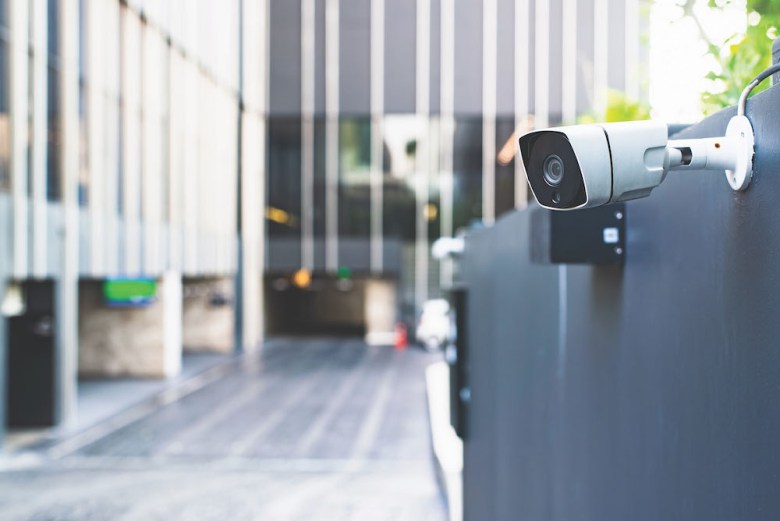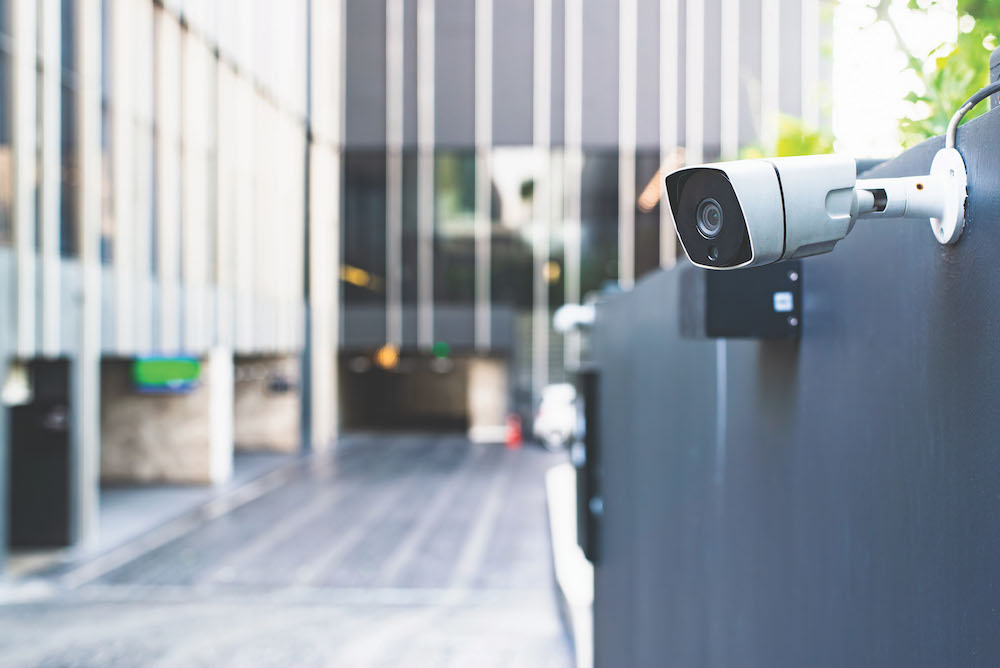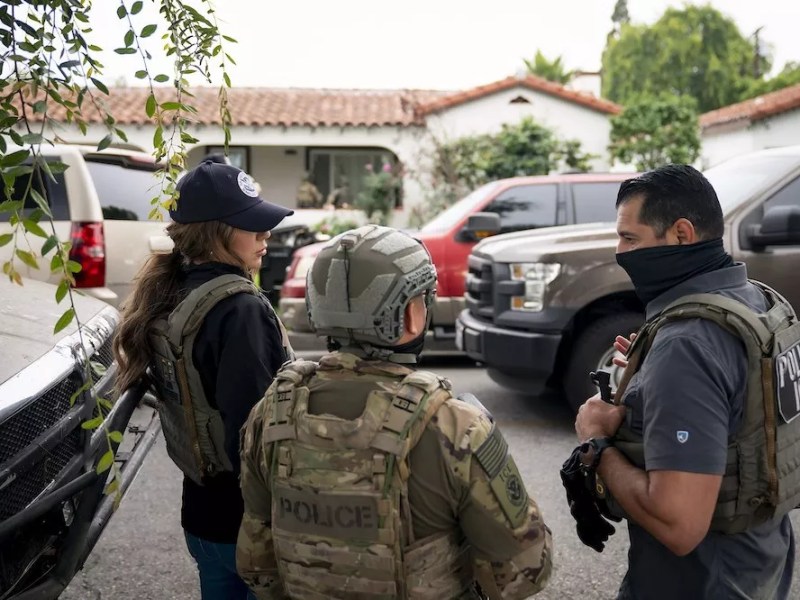 A modern security camera attached to a building’s exterior wall oversees an entrance area. Credit: Shutterstock / CC7
A modern security camera attached to a building’s exterior wall oversees an entrance area. Credit: Shutterstock / CC7
Bad Takes is a column of opinion and analysis.
When Police Chief William McManus appeared at City Council’s budget meeting last month, he tried to justify the purchase of AI software as something which would improve efficiency by helping officers with time-consuming reports.
“These emerging technologies are about one thing: helping officers spend less time on paperwork and more time protecting our community,” the chief said.
Unfortunately, the only randomized control trial to test the time-saving benefits of AI on police reports suggests the outlook isn’t promising. Published this spring in Applied Police Briefings, the analysis looked at a medium-sized police department that agreed to participate for more than a full year. The principal finding?
AI didn’t significantly shorten time spent on paperwork.
“[D]espite commercial claims that this technology will dramatically decrease the time officers spend manually writing initial reports, no experimental test of those claims has been reported to date,” the study’s five authors, who have backgrounds in law enforcement, criminology and police-community relations, wrote. “As is often the case, rapid adoption of police technology is often done in advance of the empirical record on the ability of the tool to achieve its aims and avoid unintended consequences.”
So why didn’t AI save time?
For one, many agencies use boilerplate templates for reports anyway, and if AI still requires officers to fill in the blanks, how’s that much different? We already have spellchecking technology. Not to mention, streamlining the narrative-writing process doesn’t necessarily cut down on meat-and-potatoes data entry like including every witness a cop spoke to or all the evidence in the officer’s possession. Many workers today waste time meticulously going over AI-written responses when we probably could have written the damn thing ourselves — and just as fast.
AI-assisted police reports were only one of the emerging technologies council heard about at the budget meeting under the goal of “proactive policing.” Indeed, even the fire department got in on the action.
Fire officials outlined their desire to buy two tethered drones and six free-flying units for $291,000. They promised the devices would help with search and rescue, hazmat assistance sizing up wildfires and something far more vague: “special events.”
Could that include drone surveillance of street festivals such as Fiesta?
“What entities are allowed to access this data?” asked interim District 2 Councilman Leo Castillo-Anguiano, referring to the information the drones would collect.
City Chief Information Officer Craig Hopkins stepped in to assuage privacy concerns.
“All data is city-owned,” he said, adding that “vendors are under contract with us, and the IT shop is responsible for supporting them to make sure that that privacy stays in place.”
However, the discussion left the exact terms of those contracts unexplored. What if Immigration and Customs Enforcement calls up and asks for SAPD’s and the fire department’s camera footage, for example?
Of course, data breaches are an always expected surprise as well. In 2021, 1.8 terabytes of helicopter and drone video, mostly captured by the Dallas Police Department, magically appeared on the Distributed Denial of Secrets website, a WikiLeaks-like outlet that publishes hacked materials. The 600 hours of footage included not only mass public gatherings, but, as D Magazine reported at the time, everyday people unloading cars in front of their houses or relaxing in their backyards.
McManus told the council that SAPD’s drone program been in use “for quite a while” and “very, very frequently” at large events, around barricades and in traffic investigations.
“We’ll expand it to the point where we’re satisfied that we have what we need,” he said.
If what’s needed is for the populace to feel we’re always being watched, then mission accomplished.
Technically, Centro San Antonio — formerly the Downtown Owners Association — and city government are still assessing the one-year pilot of “advanced camera monitoring” in the downtown corridor, according a slide in McManus’ presentation.
To his credit, when questioned by District 7 Councillor Marina Alderete Gavito, the chief revealed that “those cameras downtown and the AI capability they were supposed to have did not function as they were supposed to.”
McManus also said he opposed installing facial recognition technology on the equipment, which is laudable if true. Nevertheless, he added that ”the plan is to expand the camera system to a much broader area, even if we’re not powering it by AI.”
District 5 Councilwoman Teri Castillo struck a more skeptical tone.
“I do have concern in terms of just the liberty to exist in society without having your face scanned and monitored, uploaded to a database that can potentially be monitored, and how we may be invading on people’s privacy in practice with these efficiency tools,” Castillo said.
She also raised the possibility of AI-written police reports revealing personally identifying information about victims of domestic violence.
To Castillo’s point — especially her use of the phrase ”the liberty to exist” — the above-cited study on law enforcement agencies’ use of AI concluded with a note of caution.
“As the inevitable tide of AI-assisted technologies comes to policing’s shores, it is essential to approach the widespread adoption of AI technologies with a critical eye,” the authors noted.
In the wake of President Donald Trump’s militarized takeover of DC, cities such as San Antonio would do well to choose caution over panopticism.
Subscribe to SA Current newsletters.
Follow us: Apple News | Google News | NewsBreak | Reddit | Instagram | Facebook | Twitter | Or sign up for our RSS Feed
Related Stories
Right-wing pundits and politicians have shown no qualms about deflecting blame when it comes to the tragedy.
Passage of Trump’s ‘Big, Beautiful Bill’ is evidence that a ‘strong Republican Party’ isn’t in the best interest of most Americans.
Even some South Texas Republicans are pushing back at the roundups, which aren’t just capturing criminals but people who pose no safety threat.
This article appears in Sep 3-17, 2025.



